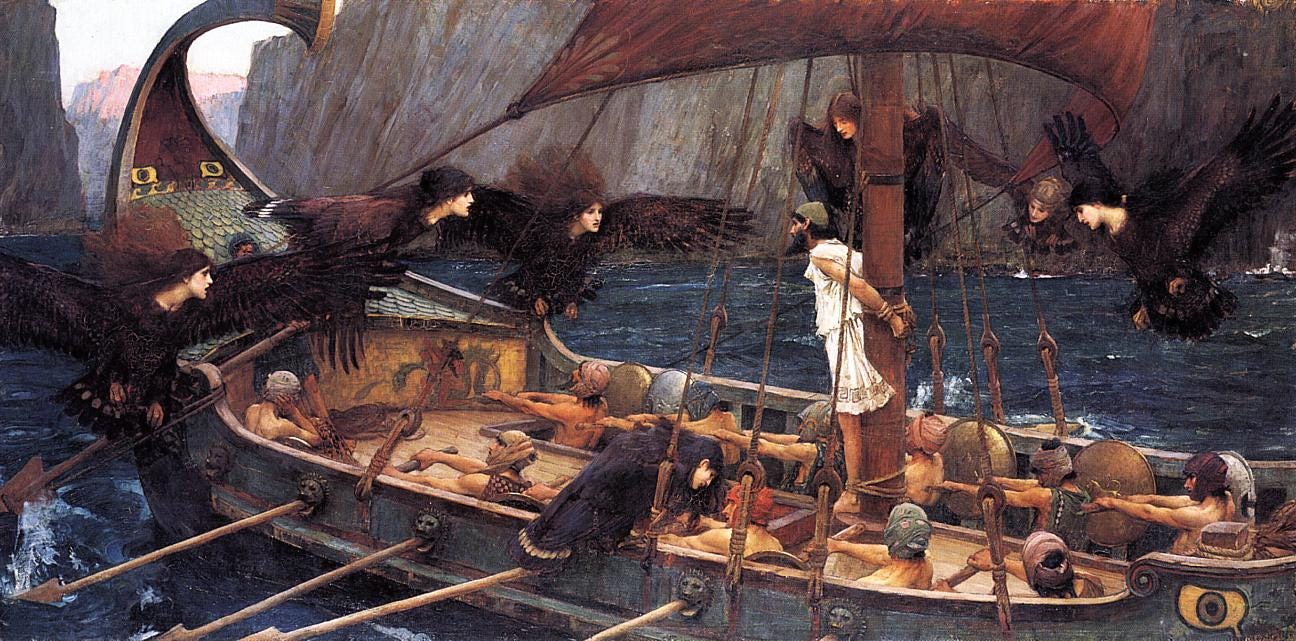"I am a part of all that I have met"
Homer, Tennyson, and the Living Memory of Odysseus
I was sixteen when I fell in love with poetry, thanks to Tennyson’s “Ulysses.” It is fascinating to think of how many years between then and now have passed in comparable forgetfulness; but that year is lodged in my memory as a time of awakening. It isn’t as though I was completely unfamiliar with poetry, either—after all, I’d fallen in love with Shakespeare not long before. But reading “Ulysses” (the name is the Romanized version of “Odysseus”) was a revelation, leading me to more of the English poets, especially the Romantics. Today, still, I am as full of tears as Penélopê remembering Odysseus, when I recall that poem and that time. It is a living memory.
And memory is one of the great themes of Homer’s Odyssey.
A year earlier, when I first read The Iliad and The Odyssey, I preferred The Iliad. Now, on this reread for our Great Books Challenge, I am surprised by this. The Odyssey is such a winning myth, a fairy-tale full of seafaring adventure; it is also a more personal and accessible tale, filled with the nostalgia of home. It glories in life and survival, as The Iliad glories in, and mourns for, the dead.
The Iliad and The Odyssey are each, in their own way, perfect, and the parallels between these two great literary compilations of years of oral tradition are fascinating: each is divided into twenty-four Books; each begins near the end of an adventure of approximately ten years in total. And it is particularly interesting, as Pietro Pucci writes in “The Song of the Sirens,” that it is the Siren passage in The Odyssey that is particularly “Iliadic” in tone/grammar, and even in the repetitions of certain phrases such as “over all the generous earth”: “The Sirens’ conspicuous use of Iliadic traditional phrases can hardly be an accident; on the contrary it forces the listener to the realization that they mean to define Odysseus as the Odysseus of the Iliad” (Pucci 194). If the sailors listen to their song, they’ll be lured away from their true adventure, whose active recall keeps the past ever present and forward-moving. In this way, the Siren song has the same effect as that of the lotos: oblivion to the task at hand, which is connected to active memory. Still, it is fascinating that Odysseus has the chance to hear it—this is part of his lust for knowledge and adventure—but he must have his muffle-eared crew literally tie him to the mast to prevent him physically retreating in the direction of the deadly song. To adventure, and yet not to yield to the temptations, is key.

“I am a part of all that I have met”: Place, Memory, & Psychogeography
Many—even Victorian-era Prime Minister William Gladstone—have tried to map the actual adventures of Odysseus, as though these fairy-tale landscapes filled with giants, one-eyed beings, and Sirens could be connected to a concrete geographical location.
Keep reading with a 7-day free trial
Subscribe to Dispatches from Biblioll College to keep reading this post and get 7 days of free access to the full post archives.



